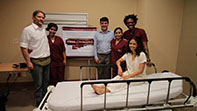Abstract
Simulation is a pedagogical technique in academia that aims to emulate authentic situations. This allows learners to immerse themselves in scenarios reflective of real-world challenges. Through repeated exposure, individuals can consolidate their learning and prepare effectively for actual case scenarios, employing the insights from such simulations.
In medical education, simulations have transitioned from mere didactic representations of clinical situations to intricate tools for instruction and assessment. This method is particularly useful in internal medicine and other specialized courses within the Health Sciences curriculum at Icesi University.
This assessment technique is predominantly employed at the culmination of the academic term. At this juncture, medical students undertake the ECO practical examination, a testament to their clinical proficiencies acquired during the term.
Commencing in 2015, the Faculty of Health Sciences at ICESI University pioneered clinical simulations with professional actors portraying simulated patients. This initiative aims to augment the experiential learning of medical students and refine their pedagogical journey. The university acknowledges the inestimable value of simulations, not only as instructional apparatuses but also for evaluative endeavors.
In this manuscript, we elucidate the evolution of these instructional methods and their dual purpose as assessment tools for medical educators. We also shed light on the merits and potential challenges of their execution.
References
Coro-Montanet, G., Diéguez-Pérez, M., Cerdán-Gómez, F., García-Villalobos, M. R., Gómez-Sánchez, M., & Pardo-Monedero, M. J. (2019). Protocolo de entrenar actores para escenarios de alta fidelidad en educación médica. Revista Latinoamericana de Simulación Clínica, Vol 1, (3), 144-148.
González Zamora, J. H. (2006). La evaluación de los estudiantes en un proceso de aprendizaje activo. Cartilla Docente publicación del CREA. Universidad ICESI.
Moore, P. L. (2016). Pacientes simulados en la formación de los profesionales de salud: el lado humano de la simulación. Revista médica de Chile 144, (5), 617-625.

This work is licensed under a Creative Commons Attribution-NonCommercial-ShareAlike 4.0 International License.
Copyright (c) 2024 Papel Escena


